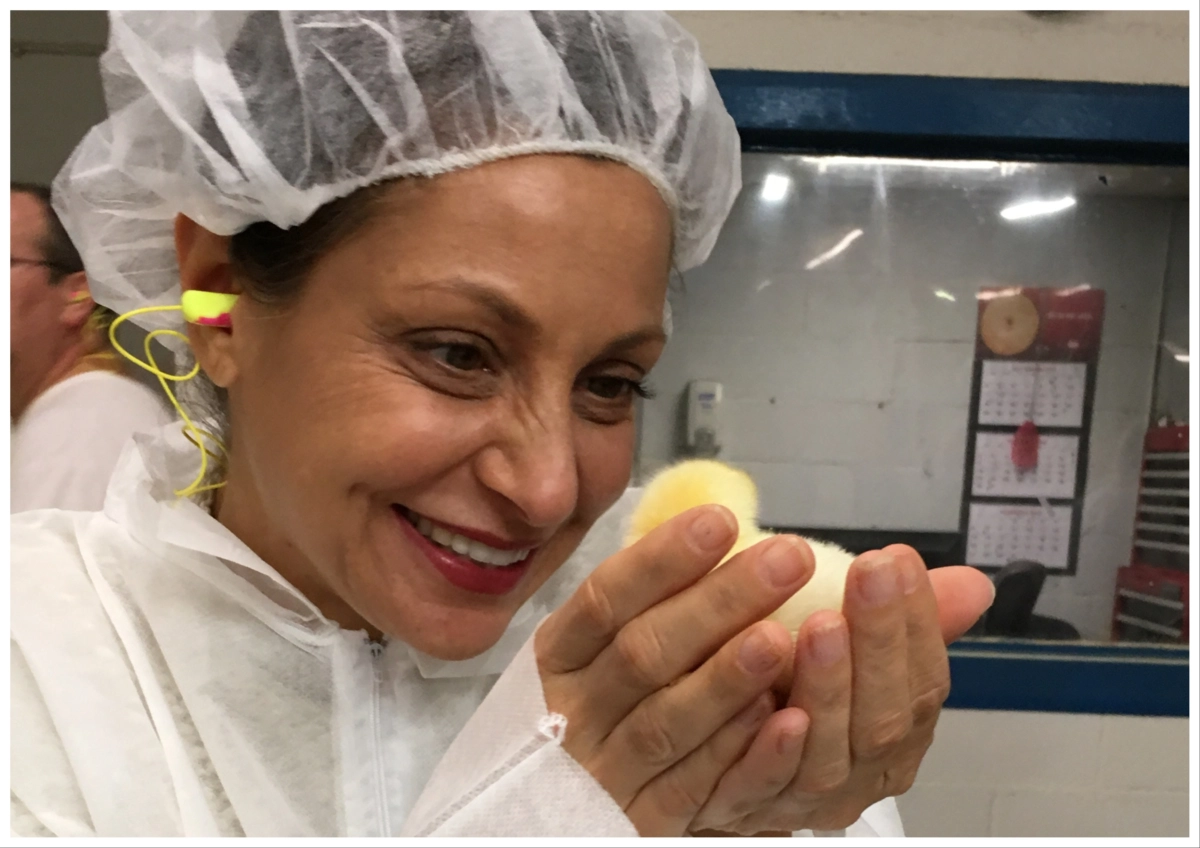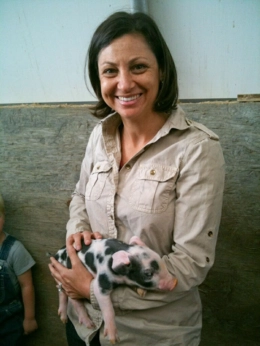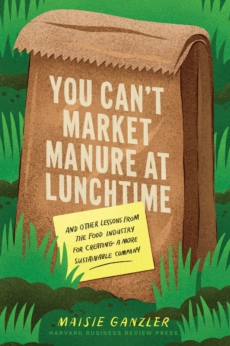In her new book, Bon Appétit Management Company strategic advisor Maisie Ganzler talks about the business of marketing sustainability.

The title of Maisie Ganzler’s new book, You Can’t Market Manure at Lunchtime: And Other Lessons from the Food Industry for Creating a More Sustainable Company, was born out of an experience Ganzler had while operating as chief strategy and brand officer at Bon Appétit Management Company. Bon Appétit is a food service company that caters for universities and corporations, operating more than a thousand cafes across the country.
When challenging its pork producer about its use of manure lagoons and the myriad health and environmental issues they pose, Ganzler knew that Bon Appétit’s end goal was not only to source more sustainable pork but to be able to communicate effectively with its customers about the issue—something that is quite difficult, since no one wants to talk about manure when they’re eating.
This tension is at the heart of Ganzler’s new book: How can companies practice authentic sustainability and work it effectively into their marketing strategy? In the book, Ganzler details Bon Appétit’s progress and missteps in navigating issues such as farmworker rights, pigs raised in gestation crates, chickens in cages, and more. The book, which comes out April 2, also includes interviews with other industry experts who talk about their experiences, including: Rob Michalak, former global director of social mission for Ben & Jerry’s, who talks about integrating sustainability into operations and his experience with Milk with Dignity organizers; Gary Hirshberg, co-founder of Stonyfield Organic, who discusses picking your battles and taking stands on issues; and Lisa Dyson, CEO and co-founder of Air Protein, who talks about creating alternative protein and striving to be the number one meat company in the world.
This interview has been edited for length and clarity.
Modern Farmer: In your book, you say that when a business does something right or makes progress toward a sustainability target, it should get credit for it. This can bolster the business, but you write that it can also create a ripple effect toward industry change. How so?
Maisie Ganzler: A great example of that was in 2005, when we at Bon Appétit made a commitment to cage-free eggs nationwide. We heard that the client at another corporation said to their food service provider, ‘We’d like cage-free eggs served here,’ and the food service provider said ‘Oh, we can’t do that. There’s not enough available, blah, blah, blah,’—all these excuses. And the client said, ‘Well, Bon Appétit does it for their locations. So, I’m sure you can do it here, too.’ That’s the ripple effect that I’m talking about—once a company has proven that something is possible, other companies now need to come to the table and do the same.
MF: Something you worked on passionately was sourcing pork from producers that don’t house pigs in gestational crates. You didn’t reach this goal overnight but through a series of milestones. You eventually accomplished this with pork producer Clemens Food Group, on which Modern Farmer reported here. To get there, you first had to hear big companies tell you no, it wasn’t possible. Why did you push on regardless? How were you confident you could achieve something that wasn’t being widely done at such a large scale?
MG: I pushed on for two main reasons. One was that it was simply the right thing to do. If you’ve seen a sow in a gestation crate, it’s heartbreaking. They can’t turn around, they can’t walk; it is very clear that something better could be done for that animal. So, that’s where we start, rooted in the idea that it’s the right thing to do for the animal. But as you’ve pointed out, we’re also a business and we want to get market credit. And we had made a public promise, and I was not going to go back on that. So, while I was transparent about the difficulties and about missing the deadline, I never wanted to say it can’t be done. Was I confident that it could be done? Not necessarily, but I don’t need confidence to keep pushing forward.
MF: You advise companies to own their challenges and obstacles to achieving their sustainability goals—something that can be tempting to hide. Why is it actually better to be transparent about these things?
MG: Being transparent is important because one, it will insulate you to some degree from greenwashing claims. If you are the person that’s stepping forward and saying here’s where we fell short, nobody can have that “gotcha” moment. The other thing is that it actually gets you more credit in the end. If you pretend that everything’s easy to do, why should anybody celebrate that you did it? If you’re transparent about how challenging it was, how many bumps there were in the road, how many times you failed and redoubled your efforts, how much more expensive it was, then all the more reason for customers or advocacy groups to laud your accomplishment when you finally do pull it off.
I don’t think that anybody on the consumer side, anybody reasonable, expects perfection from a company. But they do expect honesty. And I think that’s a reasonable expectation. One of the things that I talked to Gary Hirshberg about, the founder of Stonyfield, is he talked about people needing to make an emotional connection with the brand, especially if you’re asking them to spend more money on something. Just what I was talking about [with] gestation crates, and how they are so horrible for sows, that cuts to my heart, not necessarily to my head, because it is more efficient, it is more cost-effective, but my heart tells me something different. And a lot about building an authentic brand based upon sustainability is listening to your heart and being open with your heart.
If you’re not authentic in your desire to make real change, I think that people smell that. And you may actually have something backfire. Instead of [achieving] what you want, you may be in a worse position if you’re inauthentically making these promises.

Ganzler holds a piglet. (Photography provided by Maisie Ganzler)
MF: You talk about how in Bon Appétit’s Farm to Fork program, you don’t require that producers be certified organic, but you do require that farms be owner-operated. As a farmer in St. Louis told you, if you’re a small farm, you can’t afford to scrap a whole field if you have a fungal outbreak, you need to be able to apply a fungicide. If you held firm to requiring organic certification, you’d end up putting the squeeze on some of your smaller producers. When setting a sustainability goal, how do you make sure that the parameters you choose can actually help you achieve your desired outcome?
MG: You have to first be really clear of what your desired outcome is. So, for the Bon Appétit Farm to Fork program, the desired outcome was to support farmers that were growing for taste—that was the initial impetus of the program: to get the best-tasting food. And to do that, we decided that we had to support small-scale farmers that were close to us that were able to grow for flavor, as opposed to grow for conformity or transportability or a whole host of other reasons. Be really clear about what your goal is.
MF: Considering Bon Appétit’s size and reach, you encounter a lot of issues in our food system. You work with producers across a wide geography and advocates on a wide breadth of issues. From your perspective, what are the biggest issues in our food system right now?
MG: From sitting in the chair of a food service company that’s a buyer, I think that the biggest issues really surround animal agriculture, how animals are treated and the impacts that the raising of those animals have on our environment. And there’s a lot of different things in play. And there’s a lot of strong opinions but also some conflicting information. So, I would say that there’s a whole host of issues around animal agriculture.
MF: For small farmers or food businesses that don’t have a marketing department, budget or training, do you have any advice for how they can still tell their story effectively?
MG: I think that the first thing is that they need to figure out what their story is and distill it down. If they have a package, what can they put on the package that quickly communicates the most salient points of their story, not the encyclopedic version of it, because no one’s going to take time to read that. Everybody’s got a website, so the same thing there, really figuring out what your headline is and succinctly communicating that to your customers. And making that headline something that does create an emotional connection with people. Not being afraid to take a stand, whether that is in the issues you take on, how you talk about them or where you talk about them.
What I was trying to communicate in the book is the importance of both making meaningful change and getting market credit for it. And that’s where the title comes from—You Can’t Market Manure at Lunchtime. There was this real environmental change we were after, dealing with manure lagoons, but we also needed to be able to talk to customers about it. Because we are not advocacy groups, we are for-profit companies. But we have the power to do good in this world and capitalize on it. And there’s nothing shameful about that duality.
